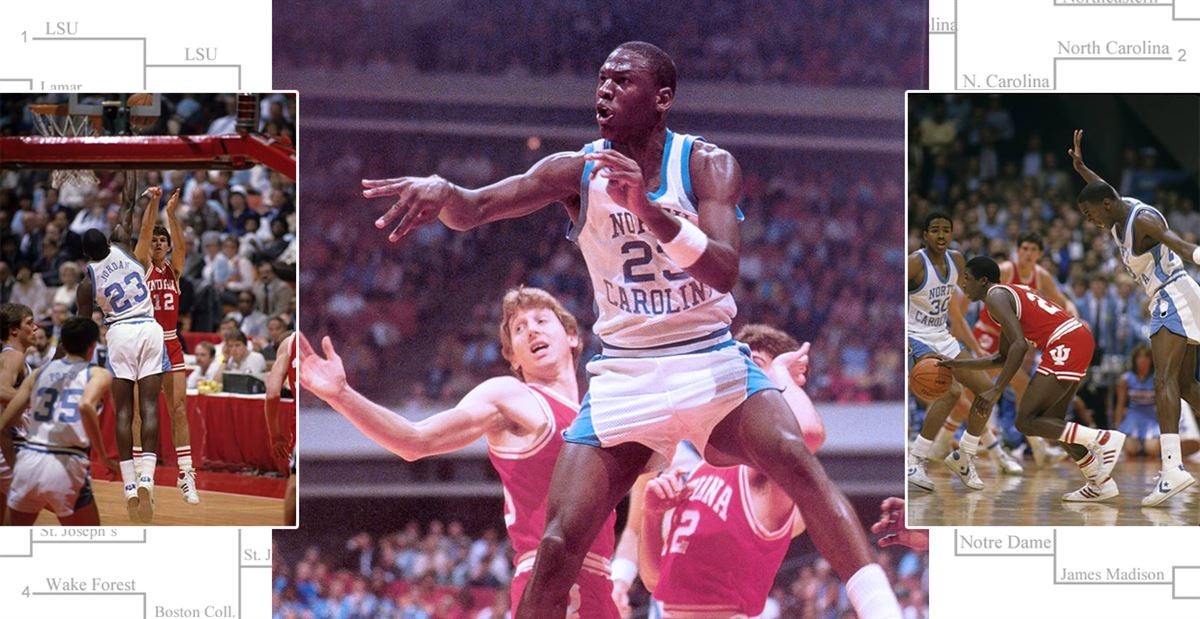
Easily the worst loss in North Carolina’s history occurred in 1984 to Indiana in the regional semifinals of the NCAA Tournament. The top-ranked Tar Heels, 28-2 with two losses by a total of three points, featured the game’s greatest player along with four other first-round NBA picks and had, as then-assistant coach Roy Williams said, “everything that you need to win the national championship.”
Indiana, national champions three years before this season and again three seasons later, did not have one of its vintage teams. The unranked Hoosiers, 21-8, had lost to Miami (Ohio), UTEP and Northwestern and finished third in the Big 10. Its roster would score 1,249 points in the NBA. Carolina’s roster would exceed 70,000.
The game hinged on Michael Jordan’s subpar performance as he missed much of the first half after picking up his second foul. Historians have debated, and cynics asserted, his prolonged absence cost Carolina the game. But did it?
The facts …
The Tar Heels, rock stars of the 1984 college basketball world, had Jordan, Player of the Year, and Sam Perkins as first-team All-Americans. The team had only lost at Arkansas by one and stumbled in its ACC semifinal against Duke. Point guard Kenny Smith was still recovering from a broken wrist and center Brad Daugherty was playing through a less-publicized hand injury.
Nonetheless, Indiana was expected to offer little resistance in the East Regional semifinals in Atlanta’s Omni. But coach Bobby Knight, by then a two-time national champion, was not going to allow his team to back down from anyone. Knight asked Dan Dakich, a 6-foot-5 junior reserve who averaged just under four points, to guard Jordan by focusing on keeping him off the boards and preventing back cuts and post-ups.
Still, Jordan scored the game’s first four points on a jumper and a baseline drive, as smooth a four as he ever scored. He seemed ready to go off. But two minutes into the game he committed an unnecessary reach-in foul. Indiana, per Knight’s game plan, aggressively attacked Carolina’s pressing defense and hit some open jump shots to take a 10-8 lead, despite four turnovers.
With 12:45 left, the game turned and Carolina history was altered. Jordan went backdoor and caught a lob pass as two Indiana players defended, exactly the play Knight was trying to avoid. Jordan caught the ball, fell to the floor, and the whistle blew.
Foul on Michael Jordan. From this replay, it’s hard to determine how this is possible. Either this is a phantom call or the camera couldn’t capture Jordan somehow catching the pass with two hands while doing something to Uwe Blab’s midsection.
“We have a foul and … it’s gonna go on Jordan. I don’t believe it,” CBS’s Gary Bender said. Analyst Billy Packer on the replay chuckled a little and added “hard one to understand there.”
Coach Dean Smith removed Jordan to prevent a third foul. Contrary to multiple reports otherwise, Jordan did not sit the rest of the half. He returned with 4:48 remaining after about seven minutes, long enough for Packer to repeatedly question the wisdom of him sitting. With Jordan out, the teams tied 10-10.
In fairness to critics, Jordan didn’t stay in for long. He came back out about a minute later, and Packer started telling viewers how Smith often uses the first half as a way to get to the second half.
Jordan returned again with Carolina down four. During his one defensive possession, he rushed Alford into a rare miss. The sight of Jordan flying toward a jump shooter convinced Smith to bench him the rest of the half.
With five seconds left, the teams had played to an 18-18 tie without Jordan. Then Alford hit a 23-footer over Matt Doherty and Smith at the buzzer, giving Indiana a 32-28 lead. The Tar Heels at that point were minus two with Jordan in the game and minus two with him out. Jordan had not scored since the first minute.
The second half was an exercise in Carolina frustration. As Jordan himself said, he tried to cram 40 minutes’ worth of play into a half. His jump shots rimmed out. He beat Dakich to an offensive board in time to goaltend a teammate’s shot that was going in. He committed his third foul rebounding over Dakich’s back.
With 17:15 left, Daugherty reinjured his hand, rendering him ineffective (he finished with three points). By then, Dakich had committed his fourth foul and Indiana, leading by four, was in the process of four consecutive turnovers.
But Carolina couldn’t get closer than two. Indiana’s Stew Robinson got a steal and layup and it was 38-34. Alford hit another jumper and completed a three-point play off another steal to make it 45-38.
At the eight-minute mark came a substitution perhaps more disastrous than Jordan sitting eight minutes of the first half. With Indiana leading, 51-45, Jordan and Perkins, apparently both tired, sat down.
Alford immediately scored. Carolina struggled to find a shot and settled for a miss from Buzz Peterson. A breakdown from a double-team left Dakich alone for an easy two. Jordan and Perkins returned after a minute that went minus four, and when Alford somehow scored on a breakout layup over Jordan to make it 59-47 with 5:30 left, Packer said the game was over.
Indiana almost missed enough foul shots to blow the game. With the lead down to two, Steve Hale and Jordan forced a loose ball in the backcourt. Hale dove for it, but ended up fouling Alford, the worst outcome for the Tar Heels. The freshman sharpshooter hit both. Jordan even came alive with moves like this one, causing Packer to wonder where this had been, but it wasn’t enough. Even with Perkins keeping Carolina in it with 26 points, Indiana held on to win, 72-68.
Jordan watched the last 1:14 from the bench after his fifth foul. His stat line: 13 points, one rebound, one assist, one steal, four turnovers and five fouls. He played 26 minutes.
Carolina was plus two with Jordan in the game and minus six without him, four of those coming during the brief second-half substitution. Indiana shot 64.9% from the floor – hitting 14 of 23 jump shots from more than 13 feet – and Carolina, second in the nation at 55%, shot 42%.
Bet you didn’t know …
Jordan said he and Smith had an arrangement to address early foul trouble. “I got the two fouls early and Coach and I have decided, in that case, I’ll come out,” he told the Raleigh News & Observer. “That wasn’t a real big factor.”
Jordan was indeed somewhat foul-prone, second among UNC’s starters in fouls. However, a review of newspaper coverage reveals early foul trouble rarely occurred that season.
Jordan sat most of the first half of an early game against Stanford and finished with four points in 7½ minutes. On Feb. 19, against Maryland, a team likely better than Indiana, Jordan sat 10 minutes of the first half with two fouls, then scored 19 in the second as Carolina won behind a closing 26-10 run. (Today, players with two fouls often sit the remainder of the half.)
Other examples of Jordan starting slowly and coming on late were not foul-related. Roy Williams many years later said Smith “was really struggling what to do during the course of that season whether to keep guys out.”
So in conclusion … As Packer said, Smith often played the first half just to get to the second. Even though Jordan missed 12 minutes of the first half, the Tar Heels trailed by only four, leaving plenty of time to overcome a less-talented team the final 20 minutes.
On the other hand … that time without Jordan allowed Indiana to gain confidence. In a game decided by two baskets, five or six more minutes of Jordan may have made the difference. Brian Barber perhaps best summed it up in this Tar Heel throwback blog.
“The Tar Heel guard playing just eight minutes in the first half, while not necessarily sinking UNC in a huge hole, also may have cost the Tar Heels first half points which were precious in a four-point loss. Then again maybe not. In the end it was ‘one of those games’ where seemingly nothing went right. The shots fell for one team and didn’t for the other.”
The Charlotte Observer’s Kevin Quirk put it bluntly in the immediate aftermath: “The Tar Heels wilted against Indiana. They seldom wilted against anyone else. There’s no explanation for that, and it’s too late to do anything about it.”
As to our original question, Jordan’s foul trouble likely cost Carolina the game. If he had it to do over, Smith maybe would sit him three or four minutes instead of 12. But more than that went wrong for Carolina on this night.





